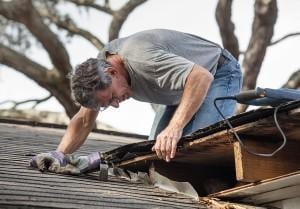Roofs are complex components that are necessary for a building to remain intact. Without them, there’s nothing to keep exterior elements from interfering with the inside of an establishment and ruining the confines of a structure.
Fortunately, there are professional roofing contractors who are equipped with the knowledge, expertise, and skill to help design and restore these structures for individuals who are in need of high-quality services. What many consumers fail to realize is that not every roof is the same. There are several differences to take into account, in terms of residential and commercial needs. The same rules or standards for home roofing repairs don’t necessarily apply to office building reconstruction.
Whether you’re considering work being done on your home or on a commercial space, it’s essential to know the difference between residential and commercial services in order to know which source to consult with and also to get an idea of what to expect, in terms of the extent of work that needs to be completed on your property.
Check out some helpful information that could go a long way during your journey to finding restorative solutions for your roof.
Differentiating Factors
Size
One of the main, and often most obvious, differences between residential and commercial roof repairs is the size of the location that contractors are assigned to work on. Roofs on office buildings, restaurants, shopping centers, schools, and other types of commercial spaces are larger than those on houses. This leads service providers to take other factors into consideration when preparing to make install roofs or make fixes.
Materials
A specific factor that must be taken into account when considering the various sizes of locations that need roof construction is the materials needed to effectively complete the task. Roofing materials typically vary, depending on whether the roofing project is a residential or commercial assignment. Although some commercial properties may use similar roof coverings that are used on residences, such as asphalt shingles or wood shakes, choosing materials highly relies on occupancy, weather conditions, and a roof’s degree of slope.
Examples of materials that are commonly used on residential roofs include, but aren’t limited to, asphalt shingles, clay tile, and granules. Commercial roofs are known to be made with metal, ethylene-propylene monomer, ceramic shingles, built-up roofs, solar shingles, among other materials. In addition, most commercial properties require the use of materials for related components, like smokestacks, airflow systems, and piping structures.
Design
Design is another differentiating factor. The majority of residential properties contain roofs with a higher slope whereas commercial spaces tend to have flat, or low-sloped roofs since they’re more expansive in size. Flat roofs usually need more repairs because they incur many problems that result from inclement weather conditions and weighty equipment. It’s not uncommon for entire sections of these structures to need frequent renovation. Residential locations, on the other hand, require less maintenance and can sometimes go for years without needing any major repairs if proper upkeep is involved.
Cost
Residential roof repair services are less expensive than commercial roof construction. Not only does the size play into the equation, but also the type of protective equipment and specially crafted tools that commercial roofing contractors need to successfully complete projects.
Training
Lastly, professional development for residential roofing contractors and commercial roofing contractors differs. Although both types of roofing services require comprehensive hands-on training, the kinds of courses and certification standards may vary. This is because installation and product knowledge differ, resulting in the need for different credential programs. Keep in mind that many roofing professionals are qualified to perform both residential and commercial roofing services.
